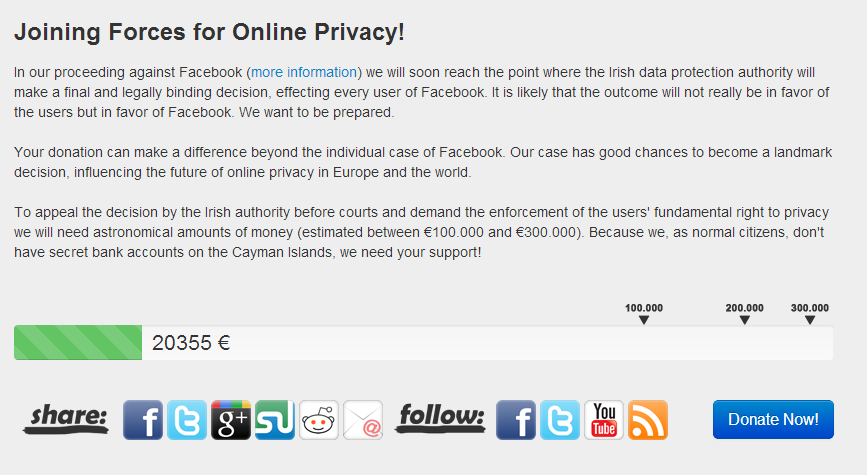Students turn to crowd-funding for Facebook privacy court case, raise €20,000

A student group planning to take legal action against Facebook has turned to crowd-funding to finance its court case.
The Austrian student group Europe-v-Facebook announced its intention last week to press ahead with a civil case against Facebook, claiming the social network is violating European data protection law.

Europe-v-Facebook is now preparing for court, and estimates that the cost of the case might range between €100,000 and €300,000. With no access to legal aid, the group is hoping to finance its battle using contributions from supporters online.
The group has set up a crowd-funding appeal at Crowd4Privacy, where users can choose to donate any amount they see fit. "People are donating an average of €20," Max Schrems, the group's spokesman, said. "If we find around 5,000 supporters, we can bring the most important issues to court. If we have more than 15,000 supporters, we can use everything we have. And if it doesn't succeed, at least we tried."
At the time of writing, the site shows the group has raised over €20,000, which it says it will put toward "lawyers, court fees and travelling expenses".
Any resulting court decision wouldn't be limited to Facebook, according to the group. "If we bring this thing to court, it might go up to the Court of Justice of the European Union. A verdict would be a signal for the online industry, similar to the antitrust proceedings against Microsoft," Schrems said.
Europe-v-Facebook had previously lodged a series of complaints about Facebook with the Irish Data Protection Commissioner (DPC). The watchdog subsequently launched an audit into Facebook's compliance with EU data protection law.
The audit resulted in several reports and 'non-binding recommendations' from the privacy watchdog. Facebook did however make some changes to its business in Europe, including turning off its facial recognition feature.
Subsequently, according to Europe-v-Facebook, the Irish DPC asked the group for a statement in response to its audit. The group last week delivered a 70-page report, which backs some of the findings of the DPC, but adds that the group's complaints have not been resolved entirely and queries whether too much trust has been put in Facebook's responses.
"In some cases the 'audit' reports seem to be based on predictions, unproven claims by [Facebook] or general assumptions that lack fact-based evidence supporting them," the report (PDF) said.
Facebook's reponse
According to a spokesman, it is Facebook's goal "to provide a service that enables millions of European citizens to connect and share with their friends here and around the world". Facebook's methods of handling user data have been "subject to thorough review by the Irish Data Protection Commissioner over the past year. The two detailed reports produced by the DPC demonstrate that Facebook Ireland complies with European data protection principles and Irish law." The company also recognises that it has "some vocal critics who will never be happy whatever we do and whatever the DPC concludes".